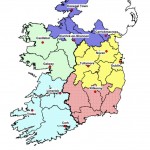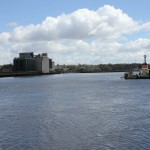In July 2014, The Department of Environment, Community & Local…
What does the River Suir mean to you?
Great turnouts and lively discussions were the order of the day for the recent River Suir community meetings. Over two weeks in July, evening meetings were held at six riverside locations throughout the River Suir catchment, specifically to ask local people “What does the River Suir mean to you?”.
Meetings were held in both Tipperary and Kilkenny at the following locations:
· Newcastle Community Hall, Tuesday 19th
· Golden Community Hall, Wednesday 20th
· Thurles, Anner Hotel, Thursday 21st
· Cahir House Hotel, Tuesday 26th
· Fethard Community Hall, Wednesday 27th
· Piltown, Kildalton College, Thursday 28th
The main purpose of the evening meetings was to open out the discussion on the Suir into water quality and other natural water issues, and explore opportunities that the Suir and its tributaries can provide to local communities.
These meetings were organised by the Local Authority Waters and Communities Office to coincide with public consultations by the Office of Public Works on the Catchment Flood Risk Assessment and Management Study.
The meetings opened with a presentation by Fran Igoe who gave the background to this new approach to the management of our natural waters, that include rivers, lakes, groundwater, estuaries, the coast and wetlands. The importance of the River Suir from a European perspective was explained, including why it was selected as a Special Area of Conservation on account of the myriad of wildlife it supports. The meetings were then opened to the floor and attendees were invited to contribute on the benefits and issues relating to the rivers from the local perspective. Needless to say this was a lively affair at all venues with discussions ranging from sewage present in the river and excessive vegetation growth; to access restrictions for walkers and the potential for river based tourism development.







Following this discussion there was an overview of the structure and role of the national Waters and Communities Office and the draft River Basin Management Plan which will be available nationally for public consultation from December 2016 to June 2017.
In Cahir the meeting started with a short workshop by Dr Craig Bullock of UCD who explained his research into the ‘ecosystem services’ provided by Irish rivers. Ecosystem services essentially are the range of benefits we derive from nature. Thus in the context of rivers these include water supply for drinking, farming and industry, fishing, amenity, and tourism. The biology of the river and how it deals with waste and nutrients was also touched upon during this presentation.
A key objective of the meetings was to explore the potential and opportunities for local communities to become more involved in the management of the River Suir, its tributaries and the wider catchment. It was acknowledged at the meetings that there is currently great work being undertaken by groups such as Workmans Boat Club in Clonmel, Crabra Wetlands near Thurles, numerous Angling clubs, River Rescue and Tidy Towns Committees right throughout the catchment. All of which is very encouraging and shows the potential for community involvement in initiatives that can make a real difference for the benefit of rivers and the communities connected with them. Internationally it is recognised that if a river is in a healthier state it will support more aquatic life and in turn benefit the economic development of an area.
Fran Igoe stressed the point “what is needed is long term support for the excellent work being carried out by local communities, encouragement for more people to get involved and reconnect with the river, and ultimately for groups to network and work together throughout the wider River Suir catchment”. This isn’t that radical a concept when you think about it, as historically the river connected communities from Waterford upstream, probably all the way to Templemore. By taking a broader view of the Suir catchment it is clear that there are opportunities to improve not just water quality and wildlife habitats but also amenity and tourism value, whilst still dealing with flooding issues.
Some might say “that’s all well and good, but we’ve heard this before?” or “can anything really be done about the issues?” Being realistic, some of the issues raised at the meetings will require major infrastructural investment, such as to providing a new or upgraded waste water treatment facilities and this will not be an easy problem to solve. Other issues can be solved through local effort and some with little funding.
All issues raised at the meetings will be forwarded by the Waters and Communities Office to the relevant public authorities and feedback will then be given to the community from where the issue was raised.
Importantly, all issues will be compiled for a River Suir Catchment submission to the draft ‘River Basin Management Plan’ in December 2016. The River Basin Management Plan will outline the issues affecting the status or quality of our natural waters and put forward a programme of measure for dealing with them over the following four years.
In the interim local communities and local authorities are being urged to consider the flood relief measures being proposed by the Office of Public Works as there may also be opportunities for proposed works to be designed in such a way that there can be additional community benefits, for example river walks, viewing points or canoe access incorporated into proposed flood management options.
The overall attendance at the evening meetings exceeded expectations and the discussions continued long after the meetings as people chatted over a cup of tea. This provided opportunity for networking and sharing of experiences of the river between the different groups present.
Future catchment meetings and inaugural annual Suir Catchment Communities Showcase
There was broad agreement that an annual event should be organised for the River Suir showcasing the work carried out by communities throughout the river catchment. This meeting is now being planned for Ardfinnan on Sunday September 25th 2016 from 2 – 6 pm.
Further River Suir catchment meetings will take place in late August/ early September as per table below.
For further information, please see www.watersandcommunities.ie, Facebook .com/WatersandCommunities, Twitter @Lawco7 or phone 0761 065 263.
| Date | Location | Start time | End time |
| Thursday 25 August 2016 | Ballymacarbry Hostel and Community Centre.
Ballymacarbry Co. Waterford | 19:00 | 21:00 |
| Tuesday 30 August 2016 | Templemore Arms Hotel.
Templemore, Co. Tipperary. | 19:00 | 21:00 |
| Wednesday 31 August 2016 | Excel Center, Tipperary Town,Co. Tipperary | 19:15 | 21:15 |
| Thursday 1 September 2016 | Main Guard, Clonmel, Co. Tipperary. | 19:00 | 21:00 |
| Tuesday 6 September 2016 | Carraig Hotel, Carrick on Suir, Co. Tipperary | 19:00 | 21:00 |
| Wednesday 7 September 2016 | Portlaw Community Hall, Portlaw, Co. Waterford | 19:00 | 21:00 |
| Thursday 8 September 2016 | Treacys Hotel (The Bridge), Waterford City | 19:00 | 21:00 |







